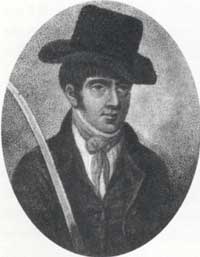11 December 2003 Edition
Michael Dwyer-Wicklow United Irishman

Michael Dwyer
This week marks the 200th anniversary of the cessation of United Irish resistance in Wicklow, spanning the Rebellion of 1798 to the Rising of 1803. The event is being marked by a lecture in Dunlavin on 5 December by Dr Ruan O'Donnell of the University of Limerick and by the unveiling of a monument to Michael Dwyer in Kiltegan on 14 December at 2pm.
Dwyer, the famous Irish rebel, grew up in the mountainous terrain of West Wicklow and joined the republican United Irishmen in the spring of 1797. He was greatly aggrieved when around 40 imprisoned comrades were summarily executed in Dunlavin in May 1798. Having fought throughout the Rebellion of 1798 in South Leinster, Dwyer rose to lead one of the most dynamic and deadly insurgent groups holding out. His exploits were considerable but it was his later career as a rebel that earned him celebrity in the early 1800s.
Victims of the Dwyer faction included soldiers, loyalists and informers in the Imaal/ Glenmalure region, although the militants generally acted in self-defence after 1799. The logic of continued resistance was their expectation of the French invasion anticipated by most protagonists. The Dwyer group would have functioned as the core of a previously dormant United Irish organisation sworn to rise and assist the French.
Accordingly, when Arthur Devlin of Crone (Wicklow) and James Hope of Templepatrick (Antrim) informed Dwyer of the contingency prepared by Robert Emmet, they soon obtained his support. Dwyer was cautious in his dealings with Emmet, Thomas Russell, William Dowdall et al, but met the leadership on at least two occasions in Rathfarnham in the spring of 1803. He agreed to second the city uprising with Wicklow reinforcements.
In fact, the necessity of warning Dwyer's men drew the Emmet coterie back to Rathfarnham on 23 July 1803, when the Rising was cancelled in the capital. As matters transpired, the Wicklowmen had waited at Rostyduff for orders that never came.
The arrests of Dwyer and Russell, coupled with the failure of the French to tip the strategic balance, threatened the viability of continued resistance. Martial law impacted negatively on friends and innocents alike, raising moral as well as pragmatic concerns for Dwyer's men. After weeks of delicate negotiations, Dwyer made terms with government on 14 December 1803, using William Hoare Hume MP as guarantor.
Soon, key insurgents Hugh 'Vesty' Byrne, Martin Burke, John Mernagh and 'Big' Arthur Devlin were added to a compact whereby transportation to Australia would be granted in lieu of courts martial. The Tellicherry transport arrived in Sydney on 14 February 1806, bringing Michael and Mary Dwyer and two of their six children. They received 100 acres in Cabramatta, alongside grants given to Byrne, Mernagh, Devlin and Burke.
In keeping with his ideological beliefs, Dwyer exercised his right to convict labour by selecting Tellicherry United Irishman Walter Clare of Thomas Court, veteran of the Rising of 1803. Byrne, similarly, selected Michael Maguire of Down, an ex-colonel of United Irishmen and associate of Thomas Russell.
In February 1807, Governor William Bligh of Bounty notoriety ordered the arrest of the Dwyer group, whom he persecuted notwithstanding their acquittal on trumped up treason charges. Bligh, however, was deposed by mutinous army officers in 1808, paving the way for Dwyer's return to Sydney after a period of exile in Tasmania.
The Wicklowman was appointed constable of the George's River district in August 1810 and was Chief Constable of Liverpool in May 1820. Unfortunately, Dwyer's various investments exposed him to the resentment of debtors which, along with his dismissal from the constabulary for misconduct, resulted in a rapid decline of fortune. He was jailed for several weeks in May 1825 where he evidently contracted the dysentery infection that claimed his life on 23 August.
Vast crowds observed the May 1898 reburial of Dwyer in a tomb covered by the imposing 'Patriots Monument' in Waverley, Sydney.
